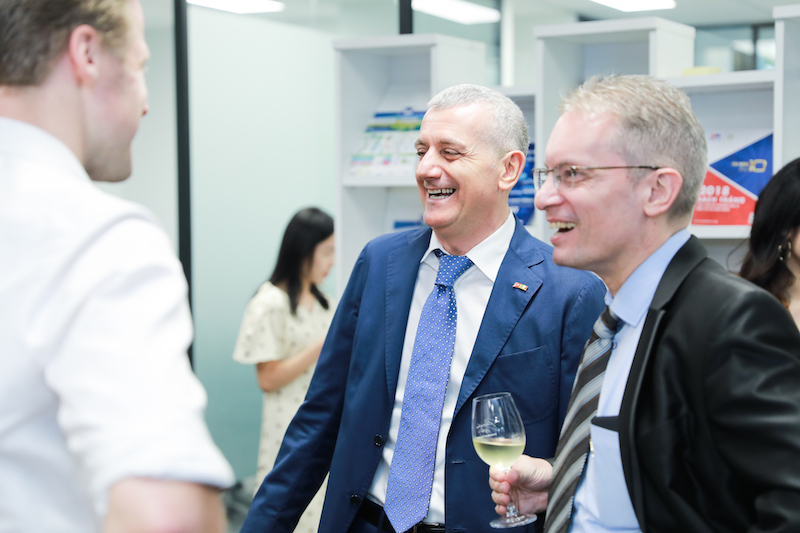EVFTA boosts trade exchange between EU and Vietnam: Vietnamese ambassador
Vietnamese businesses need to invest in improving competitiveness of their products in both quality and scale to penetrate the European market.
The EU-Vietnam Free Trade Agreement (EVFTA) has created an extremely favorable framework for trade cooperation between the two sides, however, Vietnamese Ambassador Extraordinary and Plenipotentiary of Vietnam to Belgium & Luxembourg, Head of Mission to the EU Nguyen Van Thao emphasized there is still much work to be done.
| European businesses at a recent networking event in April 2021 in HCMC. Photo: EuroCham |
After one year of implementation, the EVFTA has brought new impetus to economic cooperation between Vietnam and the EU. In the first quarter of 2021, though the Eurozone economic contraction was 0.4%, bilateral trade turnover between the two sides surged 15%.
This result has proven the strong impacts of the agreement, and even more significantly, it showed that Vietnamese products are able to meet the high standards of the EU market, Ambassador Nguyen Van Thao said.
He said the Vietnamese government should continue to discuss with the EU to reach mutual recognition on the rules and regulations for the two sides' products to enter each other's markets. Tariffs are being removed and technical barriers should be too, he added.
The ratification of the EU-Vietnam Investment Protection Agreement (EVIPA) needs to be accelerated because trade and investment are closely related, Thao said.
The agreement has been signed and is awaiting approval from the parliaments of EU member states. It is expected to promote the attraction of investment in high-tech and innovative services. New European technology will help increase Vietnamese exports and contribute to trade growth, Thao said.
In order to stay firmly in the EU market in the coming time, Ambassador Thao emphasized that Vietnamese businesses need to invest in improving the competitiveness of their products in both quality and scale to meet high standards of the European market while ensuring a stable supply.
In addition, Vietnamese businesses need to invest more in market research and EU legal framework to avoid trade litigation.
Ambassador Thao emphasized the importance of coordination between Vietnamese businesses because the European market is a “playing ground” that requires joint efforts to create higher competitiveness in terms of quantity, quality, negotiation, and network in Europe.
The prospect for trade and investment between Vietnam and the EU is bright, Thao said. Demand for imported agricultural, forestry, fishery, and seafood products of EU countries is estimated at more than US$150 billion per year, while Vietnam's export turnover of these items to the EU is about $5 billion.
In the first six months of 2021, the value of EU-Vietnam trade reached $27 billion, an increase of more than 18% compared to the same period in 2020. According to the European Chamber of Commerce (EuroCham) in Vietnam, it is a remarkable achievement in the midst of a global pandemic. And it should increase even further when the EVIPA enters into force, once it has been ratified in each EU member state.
Speaking at a related webinar on July 30, EuroCham Chairman Alain Cany said: “For Vietnam and the EU, the EVFTA will be one of the most important tools at our disposal. This is because, now that the agreement has been implemented, both companies and consumers will be able to benefit from a gradual elimination of tariffs and a mutual opening of markets.
“But if we want to build on this promising start, we need to work together," Cany said.
The EVFTA will not be a success without a coordinated effort between government and private enterprise, between political leaders and business communities. In short, implementation is not the end of the road, he added.
"Success is not a foregone conclusion, and we need to put the same effort into the next decade as we did into the last," he said.











